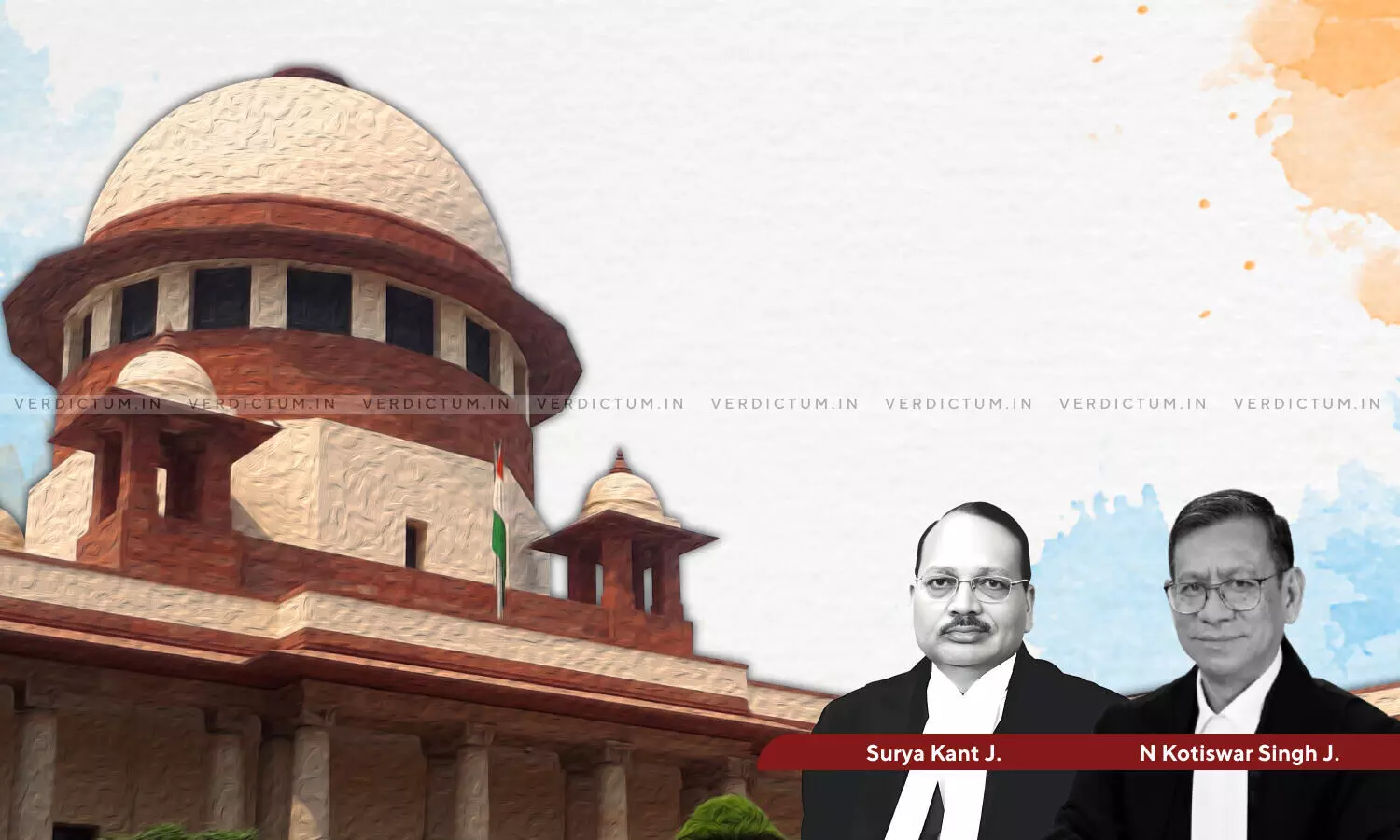
Justice Surya Kant, Justice Nongmeikapam Kotiswar Singh, Supreme Court
Classic Case Of Counterproductive Remedial Intervention: Supreme Court Allows Appeal Against Restoration Of Mumbai’s Khajuria Lake
 |
|The fulcrum of the controversy before the Supreme Court revolved around the redevelopment of a theme park on a plot, which allegedly resulted in the obliteration of a lake that had existed for approximately 100 years.
While allowing an appeal against a Bombay High Court order directing the restoration of Khajuria lake, which allegedly existed on the premises for approximately 100 years, the Supreme Court has held that a thriving recreational facility has been made and maintained at the location, which has become integral to community life.
The Apex Court also termed this matter a classic case of counterproductive remedial intervention.
The fulcrum of the controversy revolved around the redevelopment of a theme park undertaken by the Municipal Corporation of Greater Mumbai (MCGM) on a plot situated at Mumbai’s Khajuria Tank Road, Kandivali (West). This redevelopment allegedly resulted in the obliteration of a lake that had existed on the premises for approximately 100 years.
The Division Bench of Justice Surya Kant and Justice Nongmeikapam Kotiswar Singh observed, “The demolition would necessitate the removal of numerous trees, causing immediate environmental degradation requiring decades to remediate. Additionally, the expenditure of approximately Rs. 5 crores of public funds would be rendered nugatory, with further substantial public expenditure required for the proposed restoration. Such an outcome would create a paradox wherein environmental restoration results in greater ecological harm than the original transformation—a classic case of counterproductive remedial intervention.”
AOR Sudarsh Menon represented the Appellants while AOR Kunal Cheema represented the Respondents.
Factual Background
A water body known as the Khajuria Lake used to be situated in the same vicinity as the Subject Property. This water body, which had existed for over 100 years, allegedly also served as a site for Ganesh idol immersion during festivals. As per the revenue record, the Subject Property was listed as belonging to the State Government through the Collector, Mumbai Suburban District. In 2008, MCGM selected the Subject Property for development. The Corporation claimed that the lake was in an unused and bad condition, so much so that it was treated as a garbage disposal area.
Thereafter, the publication of a news report concerning the alleged filling up of Khajuria Lake spurred action in the first Respondent to file a Writ Petition before the High Court seeking demolition of the construction undertaken by MCGM and restoration of the lake to its pristine condition. During the pendency of the petition, the Collector issued post facto sanction approving the project and transferring the Subject Property to MCGM. The High Court, vide the Impugned Judgment, allowed the Writ Petition. Being aggrieved, MCGM approached the Apex Court.
Reasoning
The Bench found that the instant case presented a unique situation where one public amenity had been transformed into another that continued to serve the community unconditionally. What needed to be examined was whether this particular transformation necessarily violated the trust obligation, considering three critical factors such as the prior condition of the water body, the current ecological value of the park, and the feasibility of remedial measures.
The Bench noted that while the material on record acknowledged the historical existence of a water body at the Subject Property, it did not conclusively establish that this water body remained a functional pond by the relevant time. The affidavits filed by officials of MCGM categorically averred that when work for the project commenced in 2009, the Subject Property existed in an abandoned and dilapidated state, having deteriorated into a garbage dumping ground that had completely lost its original character as a water body.
Coming to the current ecological value, the Bench noted that the photographic evidence vividly illustrated the Subject Property as a verdant, well-maintained urban oasis replete with numerous mature trees and recreational facilities actively utilized by the community across all demographic segments. The Bench noted that expenditure of approximately Rs. 5 crores of public funds would be rendered nugatory, with further substantial public expenditure required for the proposed restoration.
On the aspect of the Collector’s post facto sanction of 2014, the Bench said, “The sanction, as it stands, thus ensures that the Subject Property shall remain dedicated exclusively to recreational purposes in perpetuity. This rider provides the necessary legal safeguard and permanency to guarantee that the land may not be diverted for any other purpose, commercial or otherwise.”
On issue of the petition being instituted before the High Court towards the tail end of 2012, nearly five years after the project’s commencement and after its completion, it said, “It is well-settled that environmental grievances must be raised promptly when alleged violations commence, not after transformative changes have materialized and become entrenched. This considerable delay has created an irreversible fait accompli wherein substantial public resources have been expended, and a thriving recreational facility has become integral to community life.”
Thus, the Bench allowed the appeal and set aside the Impugned Judgment passed by the High Court. To ensure ecological balance within the larger urban ecosystem and preserve the existing park, the Bench directed MCGM to maintain and preserve the existing park in perpetuity as a green space exclusively for public use without any predominant commercial activity. Other directions include constitution an Expert Committee to explore the feasibility of developing an alternative water body and filing a compliance report.
Cause Title: Municipal Corporation of Greater Mumbai & Ors. v. Pankaj Babulal Kotecha & Ors. (Neutral Citation: 2025 INSC 792)
Appearance
Appellant: AOR Sudarsh Menon
Respondent: AOR Kunal Cheema, Advocates Raghav Deshpande, Shubham Chandankhede, Varad Kilor, Siddharth Dharmadhikari, AOR Aaditya Aniruddha Pande, Advocates Bharat Bagla, Sourav Singh